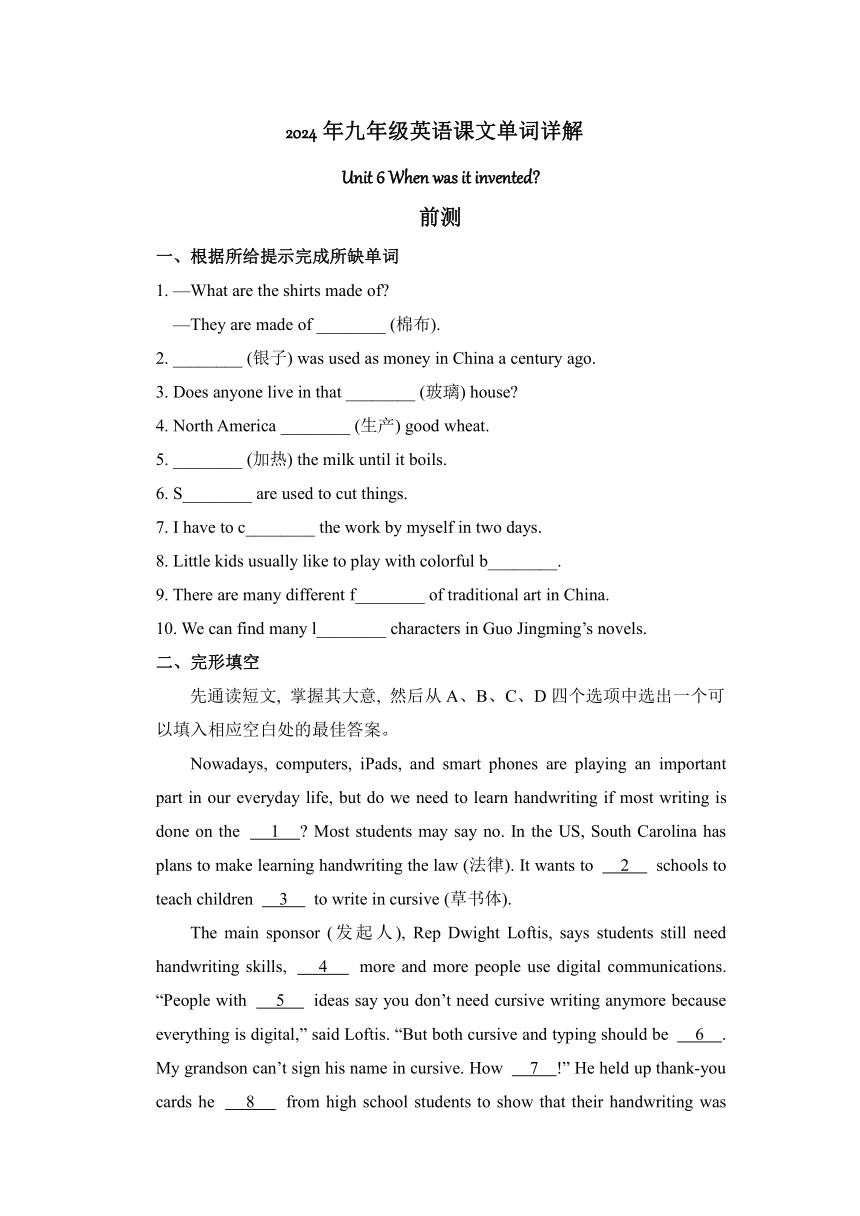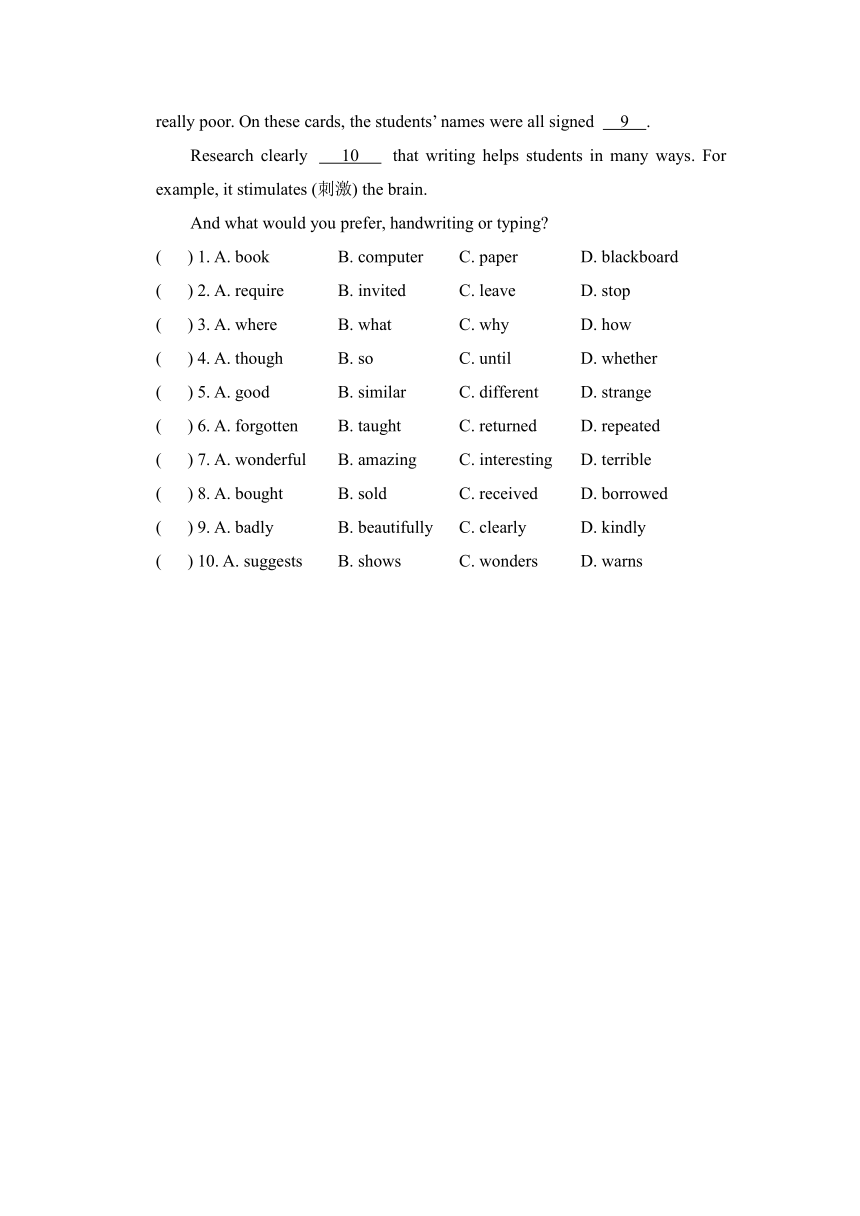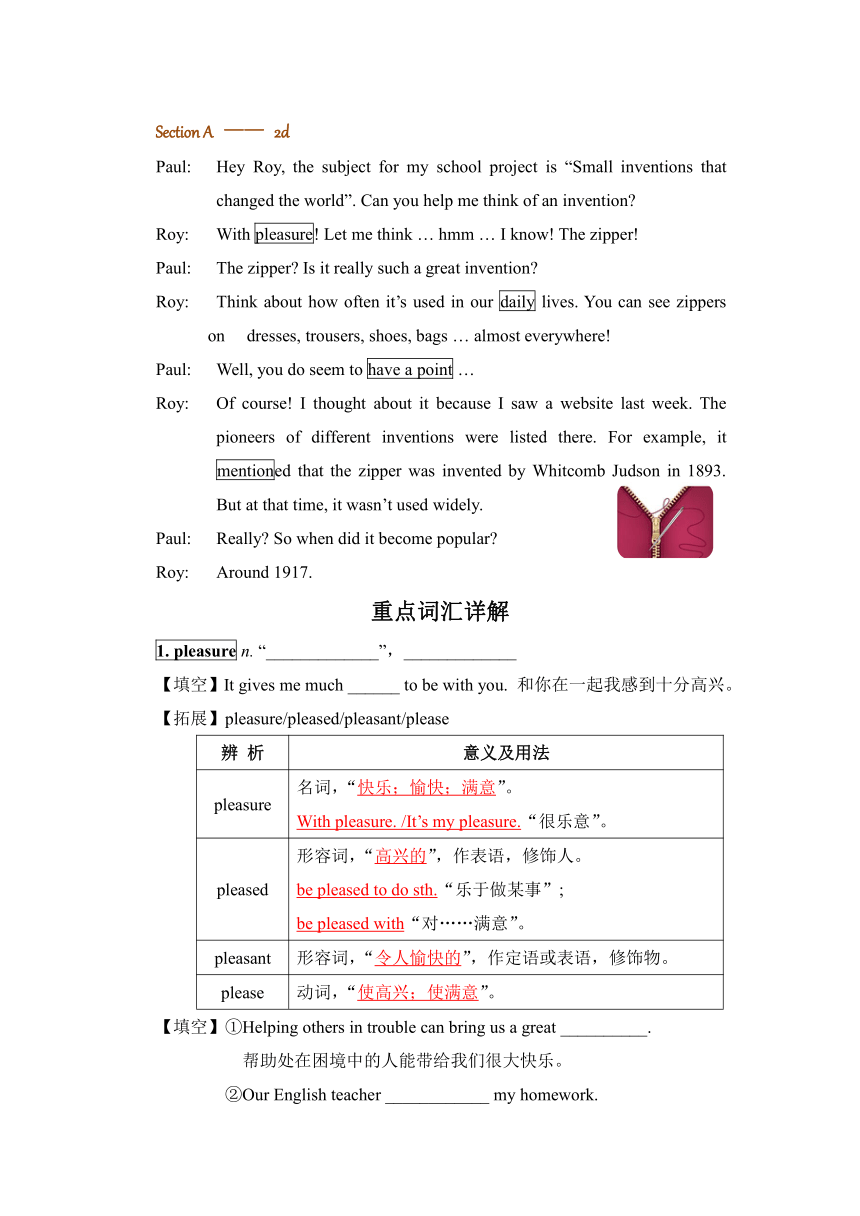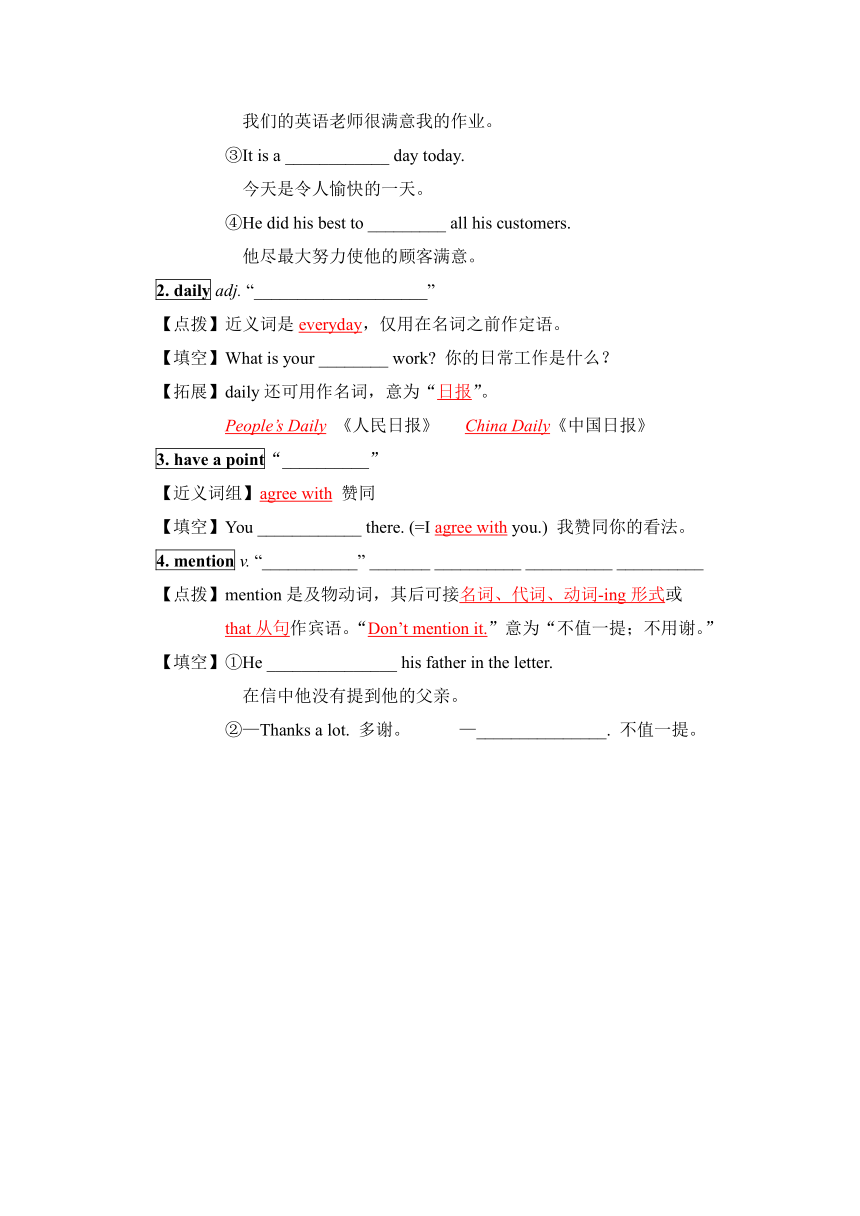Unit 6 When was it invented课文单词详解(无答案)人教版九年级英语全册
文档属性
| 名称 | Unit 6 When was it invented课文单词详解(无答案)人教版九年级英语全册 |  | |
| 格式 | docx | ||
| 文件大小 | 106.4KB | ||
| 资源类型 | 教案 | ||
| 版本资源 | 人教新目标(Go for it)版 | ||
| 科目 | 英语 | ||
| 更新时间 | 2024-05-09 07:22:02 | ||
图片预览





文档简介
2024年九年级英语课文单词详解
Unit 6 When was it invented
前测
一、根据所给提示完成所缺单词
1. —What are the shirts made of
—They are made of ________ (棉布).
2. ________ (银子) was used as money in China a century ago.
3. Does anyone live in that ________ (玻璃) house
4. North America ________ (生产) good wheat.
5. ________ (加热) the milk until it boils.
6. S________ are used to cut things.
7. I have to c________ the work by myself in two days.
8. Little kids usually like to play with colorful b________.
9. There are many different f________ of traditional art in China.
10. We can find many l________ characters in Guo Jingming’s novels.
二、完形填空
先通读短文, 掌握其大意, 然后从A、B、C、D四个选项中选出一个可以填入相应空白处的最佳答案。
Nowadays, computers, iPads, and smart phones are playing an important part in our everyday life, but do we need to learn handwriting if most writing is done on the 1 Most students may say no. In the US, South Carolina has plans to make learning handwriting the law (法律). It wants to 2 schools to teach children 3 to write in cursive (草书体).
The main sponsor (发起人), Rep Dwight Loftis, says students still need handwriting skills, 4 more and more people use digital communications. “People with 5 ideas say you don’t need cursive writing anymore because everything is digital,” said Loftis. “But both cursive and typing should be 6 . My grandson can’t sign his name in cursive. How 7 !” He held up thank-you cards he 8 from high school students to show that their handwriting was really poor. On these cards, the students’ names were all signed 9 .
Research clearly 10 that writing helps students in many ways. For example, it stimulates (刺激) the brain.
And what would you prefer, handwriting or typing
( ) 1. A. book B. computer C. paper D. blackboard
( ) 2. A. require B. invited C. leave D. stop
( ) 3. A. where B. what C. why D. how
( ) 4. A. though B. so C. until D. whether
( ) 5. A. good B. similar C. different D. strange
( ) 6. A. forgotten B. taught C. returned D. repeated
( ) 7. A. wonderful B. amazing C. interesting D. terrible
( ) 8. A. bought B. sold C. received D. borrowed
( ) 9. A. badly B. beautifully C. clearly D. kindly
( ) 10. A. suggests B. shows C. wonders D. warns
Section A —— 2d
Paul: Hey Roy, the subject for my school project is “Small inventions that changed the world”. Can you help me think of an invention
Roy: With pleasure! Let me think … hmm … I know! The zipper!
Paul: The zipper Is it really such a great invention
Roy: Think about how often it’s used in our daily lives. You can see zippers on dresses, trousers, shoes, bags … almost everywhere!
Paul: Well, you do seem to have a point …
Roy: Of course! I thought about it because I saw a website last week. The pioneers of different inventions were listed there. For example, it mentioned that the zipper was invented by Whitcomb Judson in 1893. But at that time, it wasn’t used widely.
Paul: Really So when did it become popular
Roy: Around 1917.
重点词汇详解
1. pleasure n. “_____________”,_____________
【填空】It gives me much ______ to be with you. 和你在一起我感到十分高兴。
【拓展】pleasure/pleased/pleasant/please
辨 析 意义及用法
pleasure 名词,“快乐;愉快;满意”。 With pleasure. /It’s my pleasure.“很乐意”。
pleased 形容词,“高兴的”,作表语,修饰人。 be pleased to do sth.“乐于做某事”; be pleased with“对……满意”。
pleasant 形容词,“令人愉快的”,作定语或表语,修饰物。
please 动词,“使高兴;使满意”。
【填空】①Helping others in trouble can bring us a great __________.
帮助处在困境中的人能带给我们很大快乐。
②Our English teacher ____________ my homework.
我们的英语老师很满意我的作业。
③It is a ____________ day today.
今天是令人愉快的一天。
④He did his best to _________ all his customers.
他尽最大努力使他的顾客满意。
2. daily adj. “____________________”
【点拨】近义词是everyday,仅用在名词之前作定语。
【填空】What is your ________ work 你的日常工作是什么?
【拓展】daily还可用作名词,意为“日报”。
People’s Daily 《人民日报》 China Daily《中国日报》
3. have a point“__________”
【近义词组】agree with 赞同
【填空】You ____________ there. (=I agree with you.) 我赞同你的看法。
4. mention v. “___________” _______ __________ __________ __________
【点拨】mention是及物动词,其后可接名词、代词、动词-ing形式或
that从句作宾语。“Don’t mention it.”意为“不值一提;不用谢。”
【填空】①He _______________ his father in the letter.
在信中他没有提到他的父亲。
②—Thanks a lot. 多谢。 —_______________. 不值一提。
Section A —— 3a
An Accidental Invention Did you know that tea, the most popular drink in the world (after water), was invented by accident Many people believe that tea was first drunk about 5,000 years ago. It is said that a Chinese ruler called Shen Nong was the first to discover tea as a drink. One day Shen Nong was boiling drinking water over an open fire. Some leaves from a tea plant fell into the water and remained there for some time. It produced a nice smell so he tasted the brown water. It was quite delicious, and so, one of the world’s favorite drinks was invented. A few thousand years later, Lu Yu, “the saint of tea”, mentioned Shen Nong in his book Cha Jing. The book describes how tea plants were grown and used to make tea. It also discusses where the finest tea leaves were produced and what kinds of water were used. It is believed that tea was brought to Korea and Japan during the 6th and 7th centuries. In England, tea didn’t appear until around 1660, but in less than 100 years, it had become the national drink. The tea trade from China to Western countries took place in the 19th century. This helped to spread the popularity of tea and the tea plant to more places around the world. Even though many people now know about tea culture, the Chinese are without doubt the ones who best understand the nature of tea.
重点词汇详解
1. by accident“______________”
【点拨】by accident主要用作状语,有时也用作表语。其同义短语为by chance。
【填空】I met her ____________ in a crowded bus.
我意外地在拥挤的公共汽车上遇见了她。
【拓展】其它常见的by+名词短语:
by+交通工具“乘坐” by mistake“错误地;无意中”
by hand“手工” by no means“绝不;根本不”
2. It is said that… “_____________”
【点拨】相当于people say that…, 其中it为形式主语,
that引导的从句是真正的主语。
【填空】___________ drinking milk before sleep can help you have a good sleep.
据说睡前喝牛奶可以帮助你睡个好觉。
【拓展】“It is+过去分词+that从句”的其他常见句型:
It is believed that... “人们认为/相信……”
It is supposed that... “据猜测……”
It is reported that... “据报道……”
It is known that... “众所周知……”
3. fall into “______________”
【填空】He _________ the river suddenly. 他突然掉进了河里。
【拓展】与fall相关的短语:
fall behind“落后” fall down“摔倒”
fall asleep“入睡” fall off“(从……上)掉下”
4. remain v. “_____________”_______ _________ __________ ________
【点拨】remain用作不及物动词,相当于stay。
【填空】Only a few leaves __________ on the tree. 树上只剩下几片叶子了。
【拓展】remain还可用作连系动词,意为“保持不变;仍然是”。
后接形容词、名词、分词或介词短语作表语。
【填空】①Peter became a manager but John ________________.
彼得当上了经理,但约翰仍然是一个工人。
②The shop __________ until 11 at night every day.
这个商店每天营业到晚上十一点。
5. smell n. “__________”
【点拨】smell还可用作连系动词,意为“闻起来”,后面常用形容词作表语。
【填空】①It gives off ___________. 它散发出一种芳香的气味。
②The flower ___________. 这朵花儿闻起来很香。
6. national adj. “______________”
n. nation“国家;民族”;adj. international“国际的”
【填空】①The rose is the _________ flower of England. 玫瑰是英国的国花。
②The Mainland and Taiwan are ____________.
内陆和台湾是一个国家。
7. trade n. “_____________” v. _________________
【填空】①__________ between the two countries has increased.
这两个国家之间的贸易增长了。
②The company ________ in silk, tea and other items.
这个国家从事丝绸、茶叶和其它货品的贸易。
8. take place “____________”
【辨析】take place与happen
共同点 不同点
take place ①都表示“发生”; ②happen和take place 均为不及物动词, 无被动语态。 一般指非偶然性事件的发生, 有事先预料或经过计划安排。
happen 一般用于偶然或突发性事件。
【填空】①The celebration ceremony __________ in July every year.
庆祝典礼在每年七月举行。
②How did the accident _________ 事故是怎么发生的?
9. doubt n. “______________”
【短语】without doubt“毫无疑问”=There is no doubt that…;
in doubt“疑惑”。
【填空】①_____________ your choice is the best.
毫无疑问,你的选择是最好的。
②To be honest, I’m _________ where to go in summer holiday.
说实话,我不知道暑假去哪里。
【点拨】doubt还可用作动词,意为“怀疑”,肯定句后可接if或whether
引导的从句,否定句及疑问句后接that从句。
【填空】①I doubt ____________ she will come back tomorrow.
我怀疑她明天能否回来。
②I don’t doubt _______ she will come back tomorrow.
我毫不怀疑她明天会回来。
Section B —— 2b
Do You Know When Basketball Was Invented Basketball is a much-loved and active sport that is enjoyed by many for fun and exercise. It is over 100 years old and is played by more than 100 million people in over 200 countries. It is believed that the first basketball game in history was played on December 21, 1891. Then in 1936 in Berlin, it became an event at the Olympics. Basketball was invented by a Canadian doctor named James Naismith, who was born in 1861.When he was a college teacher, he was asked to think of a game that could be played in the winter. Dr. Naismith created a game to be played inside on a hard floor. Dr. Naismith divided the men in his class into two teams and taught them to play his new game. Players on the same team must work together to get the ball in the other team’s basket. At the same time, they need to stop the competing team from getting the ball into their own basket. Today, the popularity of basketball has risen around the world, with many young people dreaming of becoming famous players. In China, you can sometimes see people playing basketball in parks, schools and even factories. Basketball has not only become a popular sport to play, but it has also become a popular sport to watch. Although America’s NBA games are the most famous, the CBA games are becoming more popular in China. The number of foreign players, including Chinese players, in the NBA has increased. There are also more and more foreign players in the CBA. Many young people look up to these basketball heroes and want to become like them. These stars encourage young people to work hard to achieve their dreams.
重点词汇详解
1. divide…into “______________”
【拓展】其被动形式为:be divided into“被分为……”,
divide指把整体分成若干部分。
【填空】①Let’s _______ these apples ___ two. 让我们把这些苹果分成两部分。
②A year has four seasons and it _____________ twelve different star signs(星座). 一年有四个季节,它被分为12个不同的星座(星)座。
【拓展】①divide的其它词组:
divide...from…“把……与……分开”; divide up“分配”。
②separate也表示“把……分开”,常与介词from连用,强调把结 合在一起或混在一起的事物分开或隔离。
【填空】Let’s help her to _________ these green apples ______ the red ones.
让我们帮助她把这些绿苹果和红苹果分开。
2. not only…but also… “__________________”
【点拨】当not only…but also… 引导的并列结构作主语时,遵循“就近一致”
原则,谓语动词与but also后的名词或代词在人称和数上保持一致。
【填空】—Not only Tom but also Lily __ coming. 不但丽丽而且露西就要来了。
—Yeah, I am so happy that they are free tomorrow.
耶,我很高兴他们明天下午都有空。
3. look up to “____________”
【点拨】to为介词,其后可接名词或代词作宾语。
look up to还可意为“仰起头看……”
【填空】①The student ___________ his teacher for his knowledge.
这个学生因为他老师的学识而钦佩他。
②The girl was so short that she had to __________ her elder sister.
这个女孩太矮,以至于她不得不仰起头看她的姐姐。
4. hero n. “____________” _________
【填空】①________________ is Jackie Chan. 这部影片的男主角是成龙。
②There are _____________ in the history of China.
中国历史上有很多英雄。
其他重点词汇
1. style n. “_____________”_________
【短语】in style“流行,时髦” out of style“过时”
【填空】①I like different _______ of clothes. 我喜欢不同款式的衣服。
②My T-shirt is _____________. I need to buy a new one.
我的T恤衫过时了。我需要买一件新的。
2. translate v. “________” _________ _________ __________ _________
n. translator“翻译员;译者”;n. translation“翻译”
【短语】translate…into…“把……翻译成……”
【填空】①These poems don’t _______________. 这些诗不好翻译。
②They __________ his book ______ several languages.
他们把他的书翻译成了好几种语言。
3. lock v. “__________”______ ______ _______ _______ n. “____”
【填空】①Don’t forget to __________ before you leave. 你离开前不要忘锁门。
②This is __________________. 这是这把锁的钥匙。
4. ring v. “_________________________” _______ _______ _______ ______
【短语】ring sb. up“给某人打电话”
【填空】①Please ______ the bell once before you enter the house.
请在进屋前按一次门铃。
②I’ll _____ you ____ when I find the information you need.
我找到你需要的消息时就给你打电话。
5. low adj. “___________”________ __________
【点拨】low还可意为“不高兴的;情绪低落的”。反义词:high“高的”;
近义词:short“矮的”
【短语】at a low price“以低价”
【填空】I bought this watch _____________. 我以低价买了这块手表。
6. sudden adj. “____________” adv. suddenly“突然地”
【短语】all of a sudden“突然;猛地”
【填空】The boy began crying ____________. 那个男孩突然开始哭了起来。
7. musical adj. “____________________” n. music“音乐”;n. musician“音乐家”
【填空】Can you play the _________ instrument 你会弹奏这个乐器吗?
8. in the end “_____________”=at last/ finally
【填空】They were out of danger ____________. 他们最后脱险了。
【拓展】
①at the end of…后接地点名词时,表示“在……尽头”;后接表示时间的 名词时,表示“在……结束时”。 We’ll have an English test _______________ this week. 在这个周末我们要举行一次英语测试。
②by the end of…“在……以前;到……为止”,常用于将来时态或过去完 成时态的句子中。 We _____________ the work by the end of last month. 到上个月为止我们已经完成了这项工作。
后测
一、根据所给提示完成所缺单词
1. For more information on weight loss and healthy eating, visit our ________
(网站).
2. Shoes with special heels can change their ________ (样式).
3. —Can you help me think of an invention
—With ________ (高兴).
4. It’s often used in our ________ (日常的) lives.
5. He was a ________ (先驱) in the field of biotechnology.
6. Would you please make a shopping l________ for the picnic
7. Her clothes are out of s________, so she wants to buy some new ones.
8. Between 1929 and 1933 America’s n________ income fell by more than half.
9. The air was filled with the s________ of flowers.
10. When you b________ it, it becomes hot enough to turn into gas.
二、语篇填空
阅读短文,从方框中选择适当的词并用其正确形式填空,使短文通顺、意思完整。每空限填一词,每词限用一次。
invent much it final different without work method so protect
In our everyday life, we can see inventions everywhere. It is so hard to imagine what life will be like 1 these inventions, like cars, computers, televisions and zippers. Even the smallest inventions can make a big 2 to our lives. The barcode (条形码) is one of the 3 useful inventions. If you want to know the information of the goods, you can scan the barcode with your smartphone. But do you know how the barcode was 4 Here is something about it.
In 1948, an owner of a small food store found 5 difficult to record the inventory(详细目录) and prices of his goods. 6 he turned to the Drexel Institute of Technology. He wanted to find a 7 to solve the problem. The good news was that Bernard Silver took up the challenge and began 8 on it. At last Bernard Silver and a group of students from the institute set up a barcode system to solve the problem. To 9 the invention, Bernard and his classmate Woodland decided to get a patent (专利). It took them about three years. 10 , on October 7th, 1952, they got the patent. And the invention is more and more widely used in the world.
1. ________ 2. _________ 3. __________ 4. ___________ 5. _________
6. ________ 7. _________ 8. __________ 9. ___________ 10. ________
Unit 6 When was it invented
前测
一、根据所给提示完成所缺单词
1. —What are the shirts made of
—They are made of ________ (棉布).
2. ________ (银子) was used as money in China a century ago.
3. Does anyone live in that ________ (玻璃) house
4. North America ________ (生产) good wheat.
5. ________ (加热) the milk until it boils.
6. S________ are used to cut things.
7. I have to c________ the work by myself in two days.
8. Little kids usually like to play with colorful b________.
9. There are many different f________ of traditional art in China.
10. We can find many l________ characters in Guo Jingming’s novels.
二、完形填空
先通读短文, 掌握其大意, 然后从A、B、C、D四个选项中选出一个可以填入相应空白处的最佳答案。
Nowadays, computers, iPads, and smart phones are playing an important part in our everyday life, but do we need to learn handwriting if most writing is done on the 1 Most students may say no. In the US, South Carolina has plans to make learning handwriting the law (法律). It wants to 2 schools to teach children 3 to write in cursive (草书体).
The main sponsor (发起人), Rep Dwight Loftis, says students still need handwriting skills, 4 more and more people use digital communications. “People with 5 ideas say you don’t need cursive writing anymore because everything is digital,” said Loftis. “But both cursive and typing should be 6 . My grandson can’t sign his name in cursive. How 7 !” He held up thank-you cards he 8 from high school students to show that their handwriting was really poor. On these cards, the students’ names were all signed 9 .
Research clearly 10 that writing helps students in many ways. For example, it stimulates (刺激) the brain.
And what would you prefer, handwriting or typing
( ) 1. A. book B. computer C. paper D. blackboard
( ) 2. A. require B. invited C. leave D. stop
( ) 3. A. where B. what C. why D. how
( ) 4. A. though B. so C. until D. whether
( ) 5. A. good B. similar C. different D. strange
( ) 6. A. forgotten B. taught C. returned D. repeated
( ) 7. A. wonderful B. amazing C. interesting D. terrible
( ) 8. A. bought B. sold C. received D. borrowed
( ) 9. A. badly B. beautifully C. clearly D. kindly
( ) 10. A. suggests B. shows C. wonders D. warns
Section A —— 2d
Paul: Hey Roy, the subject for my school project is “Small inventions that changed the world”. Can you help me think of an invention
Roy: With pleasure! Let me think … hmm … I know! The zipper!
Paul: The zipper Is it really such a great invention
Roy: Think about how often it’s used in our daily lives. You can see zippers on dresses, trousers, shoes, bags … almost everywhere!
Paul: Well, you do seem to have a point …
Roy: Of course! I thought about it because I saw a website last week. The pioneers of different inventions were listed there. For example, it mentioned that the zipper was invented by Whitcomb Judson in 1893. But at that time, it wasn’t used widely.
Paul: Really So when did it become popular
Roy: Around 1917.
重点词汇详解
1. pleasure n. “_____________”,_____________
【填空】It gives me much ______ to be with you. 和你在一起我感到十分高兴。
【拓展】pleasure/pleased/pleasant/please
辨 析 意义及用法
pleasure 名词,“快乐;愉快;满意”。 With pleasure. /It’s my pleasure.“很乐意”。
pleased 形容词,“高兴的”,作表语,修饰人。 be pleased to do sth.“乐于做某事”; be pleased with“对……满意”。
pleasant 形容词,“令人愉快的”,作定语或表语,修饰物。
please 动词,“使高兴;使满意”。
【填空】①Helping others in trouble can bring us a great __________.
帮助处在困境中的人能带给我们很大快乐。
②Our English teacher ____________ my homework.
我们的英语老师很满意我的作业。
③It is a ____________ day today.
今天是令人愉快的一天。
④He did his best to _________ all his customers.
他尽最大努力使他的顾客满意。
2. daily adj. “____________________”
【点拨】近义词是everyday,仅用在名词之前作定语。
【填空】What is your ________ work 你的日常工作是什么?
【拓展】daily还可用作名词,意为“日报”。
People’s Daily 《人民日报》 China Daily《中国日报》
3. have a point“__________”
【近义词组】agree with 赞同
【填空】You ____________ there. (=I agree with you.) 我赞同你的看法。
4. mention v. “___________” _______ __________ __________ __________
【点拨】mention是及物动词,其后可接名词、代词、动词-ing形式或
that从句作宾语。“Don’t mention it.”意为“不值一提;不用谢。”
【填空】①He _______________ his father in the letter.
在信中他没有提到他的父亲。
②—Thanks a lot. 多谢。 —_______________. 不值一提。
Section A —— 3a
An Accidental Invention Did you know that tea, the most popular drink in the world (after water), was invented by accident Many people believe that tea was first drunk about 5,000 years ago. It is said that a Chinese ruler called Shen Nong was the first to discover tea as a drink. One day Shen Nong was boiling drinking water over an open fire. Some leaves from a tea plant fell into the water and remained there for some time. It produced a nice smell so he tasted the brown water. It was quite delicious, and so, one of the world’s favorite drinks was invented. A few thousand years later, Lu Yu, “the saint of tea”, mentioned Shen Nong in his book Cha Jing. The book describes how tea plants were grown and used to make tea. It also discusses where the finest tea leaves were produced and what kinds of water were used. It is believed that tea was brought to Korea and Japan during the 6th and 7th centuries. In England, tea didn’t appear until around 1660, but in less than 100 years, it had become the national drink. The tea trade from China to Western countries took place in the 19th century. This helped to spread the popularity of tea and the tea plant to more places around the world. Even though many people now know about tea culture, the Chinese are without doubt the ones who best understand the nature of tea.
重点词汇详解
1. by accident“______________”
【点拨】by accident主要用作状语,有时也用作表语。其同义短语为by chance。
【填空】I met her ____________ in a crowded bus.
我意外地在拥挤的公共汽车上遇见了她。
【拓展】其它常见的by+名词短语:
by+交通工具“乘坐” by mistake“错误地;无意中”
by hand“手工” by no means“绝不;根本不”
2. It is said that… “_____________”
【点拨】相当于people say that…, 其中it为形式主语,
that引导的从句是真正的主语。
【填空】___________ drinking milk before sleep can help you have a good sleep.
据说睡前喝牛奶可以帮助你睡个好觉。
【拓展】“It is+过去分词+that从句”的其他常见句型:
It is believed that... “人们认为/相信……”
It is supposed that... “据猜测……”
It is reported that... “据报道……”
It is known that... “众所周知……”
3. fall into “______________”
【填空】He _________ the river suddenly. 他突然掉进了河里。
【拓展】与fall相关的短语:
fall behind“落后” fall down“摔倒”
fall asleep“入睡” fall off“(从……上)掉下”
4. remain v. “_____________”_______ _________ __________ ________
【点拨】remain用作不及物动词,相当于stay。
【填空】Only a few leaves __________ on the tree. 树上只剩下几片叶子了。
【拓展】remain还可用作连系动词,意为“保持不变;仍然是”。
后接形容词、名词、分词或介词短语作表语。
【填空】①Peter became a manager but John ________________.
彼得当上了经理,但约翰仍然是一个工人。
②The shop __________ until 11 at night every day.
这个商店每天营业到晚上十一点。
5. smell n. “__________”
【点拨】smell还可用作连系动词,意为“闻起来”,后面常用形容词作表语。
【填空】①It gives off ___________. 它散发出一种芳香的气味。
②The flower ___________. 这朵花儿闻起来很香。
6. national adj. “______________”
n. nation“国家;民族”;adj. international“国际的”
【填空】①The rose is the _________ flower of England. 玫瑰是英国的国花。
②The Mainland and Taiwan are ____________.
内陆和台湾是一个国家。
7. trade n. “_____________” v. _________________
【填空】①__________ between the two countries has increased.
这两个国家之间的贸易增长了。
②The company ________ in silk, tea and other items.
这个国家从事丝绸、茶叶和其它货品的贸易。
8. take place “____________”
【辨析】take place与happen
共同点 不同点
take place ①都表示“发生”; ②happen和take place 均为不及物动词, 无被动语态。 一般指非偶然性事件的发生, 有事先预料或经过计划安排。
happen 一般用于偶然或突发性事件。
【填空】①The celebration ceremony __________ in July every year.
庆祝典礼在每年七月举行。
②How did the accident _________ 事故是怎么发生的?
9. doubt n. “______________”
【短语】without doubt“毫无疑问”=There is no doubt that…;
in doubt“疑惑”。
【填空】①_____________ your choice is the best.
毫无疑问,你的选择是最好的。
②To be honest, I’m _________ where to go in summer holiday.
说实话,我不知道暑假去哪里。
【点拨】doubt还可用作动词,意为“怀疑”,肯定句后可接if或whether
引导的从句,否定句及疑问句后接that从句。
【填空】①I doubt ____________ she will come back tomorrow.
我怀疑她明天能否回来。
②I don’t doubt _______ she will come back tomorrow.
我毫不怀疑她明天会回来。
Section B —— 2b
Do You Know When Basketball Was Invented Basketball is a much-loved and active sport that is enjoyed by many for fun and exercise. It is over 100 years old and is played by more than 100 million people in over 200 countries. It is believed that the first basketball game in history was played on December 21, 1891. Then in 1936 in Berlin, it became an event at the Olympics. Basketball was invented by a Canadian doctor named James Naismith, who was born in 1861.When he was a college teacher, he was asked to think of a game that could be played in the winter. Dr. Naismith created a game to be played inside on a hard floor. Dr. Naismith divided the men in his class into two teams and taught them to play his new game. Players on the same team must work together to get the ball in the other team’s basket. At the same time, they need to stop the competing team from getting the ball into their own basket. Today, the popularity of basketball has risen around the world, with many young people dreaming of becoming famous players. In China, you can sometimes see people playing basketball in parks, schools and even factories. Basketball has not only become a popular sport to play, but it has also become a popular sport to watch. Although America’s NBA games are the most famous, the CBA games are becoming more popular in China. The number of foreign players, including Chinese players, in the NBA has increased. There are also more and more foreign players in the CBA. Many young people look up to these basketball heroes and want to become like them. These stars encourage young people to work hard to achieve their dreams.
重点词汇详解
1. divide…into “______________”
【拓展】其被动形式为:be divided into“被分为……”,
divide指把整体分成若干部分。
【填空】①Let’s _______ these apples ___ two. 让我们把这些苹果分成两部分。
②A year has four seasons and it _____________ twelve different star signs(星座). 一年有四个季节,它被分为12个不同的星座(星)座。
【拓展】①divide的其它词组:
divide...from…“把……与……分开”; divide up“分配”。
②separate也表示“把……分开”,常与介词from连用,强调把结 合在一起或混在一起的事物分开或隔离。
【填空】Let’s help her to _________ these green apples ______ the red ones.
让我们帮助她把这些绿苹果和红苹果分开。
2. not only…but also… “__________________”
【点拨】当not only…but also… 引导的并列结构作主语时,遵循“就近一致”
原则,谓语动词与but also后的名词或代词在人称和数上保持一致。
【填空】—Not only Tom but also Lily __ coming. 不但丽丽而且露西就要来了。
—Yeah, I am so happy that they are free tomorrow.
耶,我很高兴他们明天下午都有空。
3. look up to “____________”
【点拨】to为介词,其后可接名词或代词作宾语。
look up to还可意为“仰起头看……”
【填空】①The student ___________ his teacher for his knowledge.
这个学生因为他老师的学识而钦佩他。
②The girl was so short that she had to __________ her elder sister.
这个女孩太矮,以至于她不得不仰起头看她的姐姐。
4. hero n. “____________” _________
【填空】①________________ is Jackie Chan. 这部影片的男主角是成龙。
②There are _____________ in the history of China.
中国历史上有很多英雄。
其他重点词汇
1. style n. “_____________”_________
【短语】in style“流行,时髦” out of style“过时”
【填空】①I like different _______ of clothes. 我喜欢不同款式的衣服。
②My T-shirt is _____________. I need to buy a new one.
我的T恤衫过时了。我需要买一件新的。
2. translate v. “________” _________ _________ __________ _________
n. translator“翻译员;译者”;n. translation“翻译”
【短语】translate…into…“把……翻译成……”
【填空】①These poems don’t _______________. 这些诗不好翻译。
②They __________ his book ______ several languages.
他们把他的书翻译成了好几种语言。
3. lock v. “__________”______ ______ _______ _______ n. “____”
【填空】①Don’t forget to __________ before you leave. 你离开前不要忘锁门。
②This is __________________. 这是这把锁的钥匙。
4. ring v. “_________________________” _______ _______ _______ ______
【短语】ring sb. up“给某人打电话”
【填空】①Please ______ the bell once before you enter the house.
请在进屋前按一次门铃。
②I’ll _____ you ____ when I find the information you need.
我找到你需要的消息时就给你打电话。
5. low adj. “___________”________ __________
【点拨】low还可意为“不高兴的;情绪低落的”。反义词:high“高的”;
近义词:short“矮的”
【短语】at a low price“以低价”
【填空】I bought this watch _____________. 我以低价买了这块手表。
6. sudden adj. “____________” adv. suddenly“突然地”
【短语】all of a sudden“突然;猛地”
【填空】The boy began crying ____________. 那个男孩突然开始哭了起来。
7. musical adj. “____________________” n. music“音乐”;n. musician“音乐家”
【填空】Can you play the _________ instrument 你会弹奏这个乐器吗?
8. in the end “_____________”=at last/ finally
【填空】They were out of danger ____________. 他们最后脱险了。
【拓展】
①at the end of…后接地点名词时,表示“在……尽头”;后接表示时间的 名词时,表示“在……结束时”。 We’ll have an English test _______________ this week. 在这个周末我们要举行一次英语测试。
②by the end of…“在……以前;到……为止”,常用于将来时态或过去完 成时态的句子中。 We _____________ the work by the end of last month. 到上个月为止我们已经完成了这项工作。
后测
一、根据所给提示完成所缺单词
1. For more information on weight loss and healthy eating, visit our ________
(网站).
2. Shoes with special heels can change their ________ (样式).
3. —Can you help me think of an invention
—With ________ (高兴).
4. It’s often used in our ________ (日常的) lives.
5. He was a ________ (先驱) in the field of biotechnology.
6. Would you please make a shopping l________ for the picnic
7. Her clothes are out of s________, so she wants to buy some new ones.
8. Between 1929 and 1933 America’s n________ income fell by more than half.
9. The air was filled with the s________ of flowers.
10. When you b________ it, it becomes hot enough to turn into gas.
二、语篇填空
阅读短文,从方框中选择适当的词并用其正确形式填空,使短文通顺、意思完整。每空限填一词,每词限用一次。
invent much it final different without work method so protect
In our everyday life, we can see inventions everywhere. It is so hard to imagine what life will be like 1 these inventions, like cars, computers, televisions and zippers. Even the smallest inventions can make a big 2 to our lives. The barcode (条形码) is one of the 3 useful inventions. If you want to know the information of the goods, you can scan the barcode with your smartphone. But do you know how the barcode was 4 Here is something about it.
In 1948, an owner of a small food store found 5 difficult to record the inventory(详细目录) and prices of his goods. 6 he turned to the Drexel Institute of Technology. He wanted to find a 7 to solve the problem. The good news was that Bernard Silver took up the challenge and began 8 on it. At last Bernard Silver and a group of students from the institute set up a barcode system to solve the problem. To 9 the invention, Bernard and his classmate Woodland decided to get a patent (专利). It took them about three years. 10 , on October 7th, 1952, they got the patent. And the invention is more and more widely used in the world.
1. ________ 2. _________ 3. __________ 4. ___________ 5. _________
6. ________ 7. _________ 8. __________ 9. ___________ 10. ________
同课章节目录
- Unit 1 How can we become good learners.
- Section A
- Section B
- Unit 2 I think that mooncakes are delicious!
- Section A
- Section B
- Unit 3 Could you please tell me where the restroom
- Section A
- Section B
- Unit 4 I used to be afraid of the dark.
- Section A
- Section B
- Unit 5 What are the shirts made of?
- Section A
- Section B
- Review of Units 1-5
- Unit 6 When was it invented?
- Section A
- Section B
- Unit 7 Teenagers should be allowed to choose their
- Section A
- Section B
- Unit 8 It must belong to Carla.
- Section A
- Section B
- Unit 9 I like music that I can dance to.
- Section A
- Section B
- Unit 10 You're supposed to shake hands.
- Section A
- Section B
- Review of Units 6-10
- Unit 11 Sad movies make me cry.
- Section A
- Section B
- Unit 12 Life is full of the unexpected
- Section A
- Section B
- Unit 13 We're trying to save the earth!
- Section A
- Section B
- Unit 14 I remember meeting all of you in Grade 7.
- Section A
- Section B
- Review of Units 11-14
